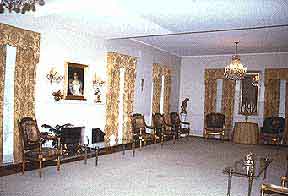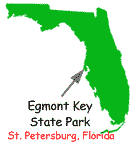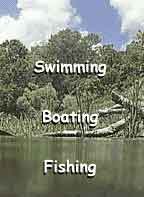|

Reservations for
Florida State
Parks are now
made through
Reserve America,
toll free, at
1-800-326-3521
|
EDEN STATE GARDENS
 Eden State Gardens was once the home of the William Henry Wesley
family is now a place of tranquility and contemplation. Yet,
nearly 100 years ago, a visit to Eden State Gardens would have
vibrated with the whir of mechanical and human energy. Eden State Gardens was once the home of the William Henry Wesley
family is now a place of tranquility and contemplation. Yet,
nearly 100 years ago, a visit to Eden State Gardens would have
vibrated with the whir of mechanical and human energy.
HISTORY
The site was the hub of the Wesley Lumber Company, one of the
many businesses involved in timbering the forests of the Florida
Gulf coast from the 1890s until after World War I. Company
holdings included a saw mill, planer mill and dry kiln. A dock
extended into Tucker Bayou to facilitate the loading of lumber
onto barges for shipment. The lumber was barged west to
Pensacola, then shipped to northern and western states, Europe
and parts of South America. The men who worked for the Wesleys
lived with their families in about 20 company-owned houses. A
company commissary served their needs. Wesley build his own
residence near the mill in 1897, and members of the family lived
there until 1953.
Fire was not unusual in these sawmill villages where every
building was made of wood, and the mill burned three times.
After the third fire, it was not rebuilt. All that remains today
on the 12 acres in Walton County are the Wesley house and a few
scattered building foundations.
Even though the little community declined and its population
scattered, the Wesley family stayed. This was their home, a
place where their births, deaths and marriages occurred. In
1953, when the last of the Wesley generations died, the house and
land were sold. Ten years later, it was on the market again; and
Lois Maxon fell in love with it and purchased it.
THE WESLEY HOUSE
The house was probably the largest residential structure in the
area. The house's timber framing was cut nearby and floated down
the Choctawhatchee river. The design was one that became
familiar throughout the Florida panhandle during the 19th
century: two stories, each made up of two equal groups of two
rooms, divided by a central hallway on both stories. Its style
of construction was well-adapted to Gulf coast conditions in the
days before air conditioning. The house was built on piers,
permitting air circulation while avoiding extreme flood damage
when Tucker Bayou or Choctawhatchee Bay rose. Porches circled
both stories. Windows on both floors were very large permitting
free air circulation during the hot, humid months.
Lois Maxon developed the Wesley house as a showplace for her
collection of family heirlooms and antiques. Changes were made
to suit her needs. Two original chimneys and partition on the
first story were removed to make the large music room. A
fireplace and chimney were added on the south porch. Extra rooms
were created at the rear of the house by enclosing the porches of
both stories. The brick infill around the foundation that makes
the house appear to have a solid basement probably dates from her
time as well. The grounds were developed by Miss Maxon to show
the house to full advantage. In 1968, Miss Maxon donated Eden to
the state of Florida in memory of her parents.
THE GARDENS
Moss-draped live oaks, which predate the Wesley Company, dominate
the lawns. Camellias and azaleas offer colorful accents to the
scene from October through May; enjoy the peak bloom around mid-
March.
THE GROUNDS
The grounds, gardens and picnic area are open daily from 8 a.m.
until sundown. The house is open for hourly guided tours from 9 a.m. - 4 p.m. Thursday through Monday. A nominal fee is charged
for tours. A picnic area with adjacent parking is available at the old mill site on Tucker Bayou.

Eden State Gardens is located in Point Washington, off U.S. 98 on C.R. 395.
For more information, contact:
Eden State Gardens
P.O. Box 26
Point Washington, Florida 32454
(850) 231-4214
View Larger Map
|




 Eden State Gardens was once the home of the William Henry Wesley
family is now a place of tranquility and contemplation. Yet,
nearly 100 years ago, a visit to Eden State Gardens would have
vibrated with the whir of mechanical and human energy.
Eden State Gardens was once the home of the William Henry Wesley
family is now a place of tranquility and contemplation. Yet,
nearly 100 years ago, a visit to Eden State Gardens would have
vibrated with the whir of mechanical and human energy.
